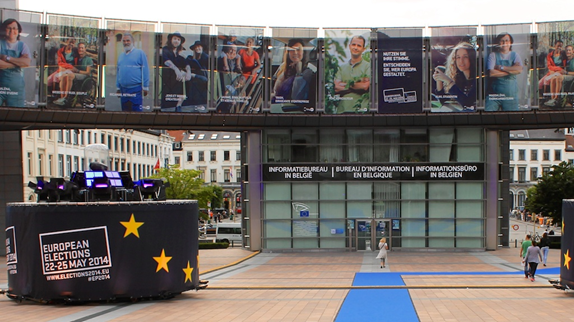QUENTIN GENARD
Brr. Brr. My phone is ringing. « Hallo? Want to have a walk? ». I just woke up… The voice on the phone is quite enthusiastic. It’s, that’s not common… « OK, I’ll take my camera and will join you ». 21°C. Mhhh Goods news. May, 25th. Oh it’s elections day! Hopefully, the European Parliament set up giant reminders for people like me.
Elections for the European Parliament
 A few meters later, the confirmation. The street in front of the headquarters of the EPP is blocked. Bodyguards are competing with paparazzi. Juncker presents himself as the winner. However, the situation seems to be less clear as the graphic shows.
A few meters later, the confirmation. The street in front of the headquarters of the EPP is blocked. Bodyguards are competing with paparazzi. Juncker presents himself as the winner. However, the situation seems to be less clear as the graphic shows.

The main points are:
- The overall participation rate remains stable (43%) but it needs a more detailed analysis, country by country with data that is, unfortunately, unavailable so far.
- In comparison with the 2009 elections, EPP loses 63 seats. It remains the first party and a coalition of the right (including ALDE) will be in majority. However, let’s keep in mind that the ambition of Juncker is not the Presidency of the Commission but the one of the EU Council. Offering the Presidency of the Commission to Verhofstadt could be a good mean to achieve a long-standing alliance with liberals. Or the European custom of EPP and PSE to rule together the European Parliament will re-take its rights… Nothing is sure so far but that the cards are now in the EPP’s hands.
- The traditional center parties are losing weight to the extreme. The score of Front National in France (25% of the voters) is an alarming signal sent to traditional parties.
Election of the House of Representatives

Further in Rue de la Loi, there is the House of Representatives and the residence of the Prime Minister, 16 Rue de la Loi. The place is empty. I turn on the radio on my iPod. « The yellow wave is unstoppable ». « The greens are collapsing ». « The reds remain the strongest ». Enough colors. The President of NV-A, the right-wing party claiming for an independent Flanders, often refers to « two democracies co-existing in Belgium ». There is truth in the sentence: indeed, Flemish candidates campaign in Flanders and Brussels while the Francophones ones are doing the same in Wallonia and Brussels. For the first time in electoral period, a debate between Flemish and Wallon candidate was organized. It can be seen as a good step, even tough only two parties were invited to debate: NV-A and the Socialist party, both foreseen winners in their respective regions. What are the main points of the results?
A preliminary remark: the results presented here are based on absolute percentages. The repartition in seats is however not completely reflected in these results as seats are decided at the canton level.

What are the main lessons?
- NV-A is the clear winner of the elections. They have a better score than in 2010 which at that time was already considered as extraordinary. In 2010, they were the main blocking party as they wanted a strong State reform. In 2014, the discourse on the State hasn’t changed and is now doubled with a strong economic liberal discourse. Can the party be avoided to speed up the negotiations? Not in the first place. They are highly legitimate as one out of three Flemish voted for the party.
- The winner in the Francophone group is the Socialist Party. They have a strong anti-NV-A stance that can complicate the situation. However, the current Prime Minister, Elio Di Rupo, is the former President of the party and has been able to form a government last time. Nevertheless, it was without NV-A. Mathematically speaking, a coalition without NV-A is possible but it will include many others parties, including extreme-left parties, which is another challenge.
- The score of extreme-right (Vlaams Belang) parties is falling, which is a good surprise considering EU and especially French results.
- The green family is quite divided. The Francophone party is falling apart, especially in regional elections (see bellow) while the Flemish family, in the opposition at the Flemish governmental level, retains its number of seats.
We face a situation where a right-wing pro-independence party will have to negotiate with a left-wing pro-unity party to find a compromise, under the pressure of others partners for a potential government… It was already the case in 2010 but now NV-A is stronger and PS weaker. Now it is the time for a royal move. The political tradition indeed implied that the King will meet the presidents of political parties and will charge one of them to negotiate a governmental agreement. It should be NV-A President, Bart de Wever, to take the lead.
My tour in Brussels confirmed the diagnostic: the same tendencies are present at the regional level.
* Photos’ author: Quentin Genard. All rights reserved.
Read also:
Q. Genard, Belgian politics: one month before the « super Sunday »
M. Makowska, Demokratyzacja, legitymizacja i dezorientacja – wybory do Parlamentu Europejskiego
A. Biernacka-Rygiel, Grecja skręca na lewo…
B. Marcinkowska, Francja: wybory samorządowe ważniejsze od europejskich?
Quentin Genard – Graduate from the Faculty of Law and Political Science, University of Liège (MA, 2012) and the Department of European Political and Administrative Studies at the College of Europe in Bruges (MA 2013). Intern at the European Movement Belgium (2010) and the Group of Research and Information on Peace and Security (Brussels, 2013). He is since associated researcher at GRIP and member of the political cabinet of a Belgian Minister, dealing with European and International Affairs.

